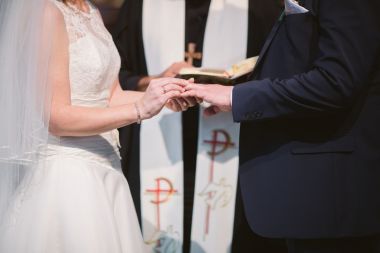Law Commission criticised over wedding proposals

The Law Commission's plans to "modernise" wedding ceremonies will "devalue" the institution, according to critics.
The Commission wants to relax rules around where weddings can take place. In England and Wales, this is restricted to a place of worship, a register office or a venue approved for civil weddings.
These rules could soon be relaxed so that couples can marry wherever they want so long as the location is deemed safe and dignified.
The commission's family law commissioner, Prof Nick Hopkins, said, "The current law on weddings is not working for many couples. Needless restrictions and outdated regulations mean that thousands each year are denied having a wedding that is meaningful to them.
"Our reforms for government are designed to protect the established practices and dignity of weddings, while offering couples more choice on where and how they marry.
"There is widespread precedent for our reforms around the world. By giving couples more control over their weddings and ensuring greater parity for all beliefs, the law can support those who want to get married, rather than putting unnecessary barriers in the way."
But The Christian Institute's Ciarán Kelly has accused the commission of being "dismissive" towards concerns raised during the consultation process.
He said: "The public wedding ceremony is a profound and solemn celebration of love and commitment. These recommendations devalue the institution, trivialise the marriage bond and undermine the dignity of the occasion.
"For the Law Commission to simply turn a deaf ear to such clear opposition to its proposals shows scant regard for marriage and for the views of the public, including those who are supporters of The Christian Institute."
The Church of England was one of the critics quoted in the commission's report.
Its submission said, "Elsewhere, the concept of dignity has been introduced (as in Q.52) as a desirable or essential factor in a wedding ceremony.
"Yet no attempt is made to define the parameters which would protect or promote dignity and, in conversation, members of the Commission have declared that they see no way to do so.
"This is a classic case of willing the ends but not the means. Instead, by abdicating any responsibility for enabling weddings to remain dignified, this proposal opens the door to frivolous, attention-seeking and farcical behaviours which could seriously undermine any notion that a wedding is a dignified and serious occasion in which both the state and the public have an interest.
"It is only necessary to see what has happened to the 'dignity' of weddings in jurisdictions that make no requirements limiting locations to see that a kind of competitive absurdity is likely to develop among a small minority of attention-seeking couples trying to outdo each other in outlandish wedding locations."











